Tangled Up In Blue(s)
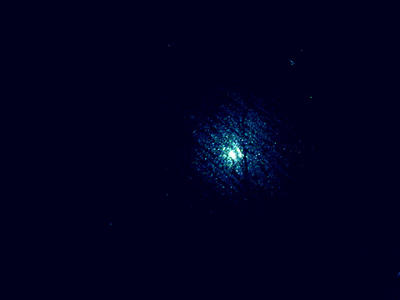
BLUE IN BLUE
Oct 19 2005
Out the hall window
at 2 a.m. my car blares
silver blue and black
in full moonlight.
Wild light bulbs that
midnight blue; the two
are icy blondes writhing
cheek to cheek over the
abyssal mother of all moons,
blueblack and cooing
wave surges toward this shore.
My bluest fantasy
disappears into sex
the way sex fades
into something roaring forward,
a tide maybe, or an age
both newer and older than
any reckoning by saner,
drier, sated Dons. Blonde on
blonde I’m tangled up in
blue in a syzygy of sames,
moon and sea like
heart and sight like singer
and psalm and all halves of
bone in parting delight,
the one melting forever
out of sight, the lucent
gleam of all that remains.
My car in vast moonlight
takes me to a shore
where savage waves pound
wondrous grains now pouring
ineluctably from the window
glass, like a naked woman
walking out a door which closes
in a silver roar of collapsing
wild blue foam. And her eyes
which caught and held me
one in that so pregnant dark --
so blue and silvery with
desire for my blueballed streams,
amid a dark which nailed me
forever to a blueblack tree
of arching fire, evanescent now,
haunting, free, bone on bone
now dreaming of silver’s swoon
in blue, reflecting every sea
which delved the ache and
arch of me to you.
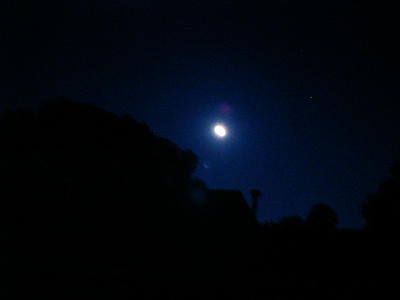
James Hillman in his essay "Blue" writes about an alchemical movement of the imagination he terms "blue" -- a motion which bears much of the ocean of Oran’s down- in- under- cold- blue- Well — a motion equally shared with the poem and the lover’s reckless plunge --:
The transit from black to white via blue implies that blue always brings black with it. ... Blue bears traces of the mortificatio into the whitening. What before was the stickiness of the black, like pitch or tar, unable to be rid of, turns into the traditionally blue virtues of constancy and fidelity. The same dark events feel different.
As even the darkest blue is not black, so even the deepest depression is not the mortificatio which means death of soul. The mortificatio is a time of symptoms. These inexplicable, utterly materialized tortures of psyche in physis are relieved, according to the procession of colors, by a movement toward depression, which can commence as a mournful regret even over the lost symptom: “It was better when it hurt physically -- now I only cry.” Blue misery.
So, with the appearance of blue, feeling becomes more paramount and the paramount feeling is the mournful plaint (Rimbaud equates blue with the vowel “O”; Kadinsky with the sounds of the flute, cello, double bass and organ). These laments hint of soul, of reflecting and distancing by imaginational expression. Here we can see more why archetypal psychology has stressed depression as the via regia in soul-making. The ascetic exercises that we call symptoms (and their treatments), the guilty despairs and remorse as the nigredo decays, reduce the old ego-personality, but this necessary reduction is only preparatory to the sense of soul which appears first in the blued imagination of depression.
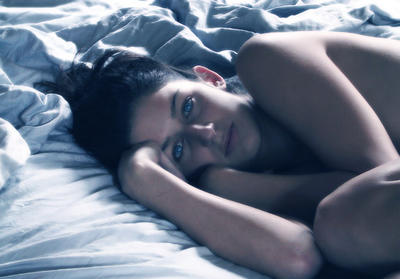
BLUE NOIR
2004
Each day I mount this
pale white writing chair
and comment my verbal
self to waters wild and wide
with no oar nor paddle
or compass or sail.
This pen voyages where
you bid, or where I
fancy you remain as
I shut my eyes and
recall a trace of you.
Today I think of the night
I followed a busty
redhead home after
the bar closed down
in the year when I
had left my wife behind
and made my way
back home. Let’s color
that singular night blue
noir, its saxophones
sexual and evil,
transgressing what I
knew was wrong
and flinging myself anyway
in the name of revels
I could neither submit
to without a wedding ring
tight around my heart,
nor resist as any
more sober man might
have. We drank burgundy
a while in that monied
professional apartment
and then she left to
go pee, leaving me alone
to stare out at the
streetlamped night
of 3 a.m., into that
maw of lost darkness
in the belly of the
whale. Everything
thick with drunkenness
and fatigue, Joe
Jackson on the stereo
& the door not far away.
So much in me still
demanding that I just
get up and go but then
she came out of
the loo wearing just a
half-buttoned shirt,
her huge breasts swaying
darkly in and down.
The embrace that soon
followed was like a boat
offshore at last on waters
profoundly deep and
wild. Oh how we went
out in the pure salt
of abandon, this way then
that, never fucking --
I didn’t have condom --
but going at it every
other way. Exhausted
spent & glistening with
all our expended oils,
we unclenched around
5:30 a.m. when she
told me I had to go
(she needed to write
a paper the next day).
And so I got zipped
and shod and kissed
her on the cheek as
she slept quenched
and sated, never to speak
to me again. I drove carefully
and raggedly back to
my mother’s house where
I was sleeping in a spare
room, aware at once
of such keen delight
amid the ruin of real love.
My wife in our house
20 miles away alone
in our queen-sized bed
with our cat curled
nearby, she believing
that I was gone for
good. A few months
later I told her I wanted
to come back, to somehow
find a way home.
A year later I moved
back home, sober,
sobered, all my errancies
named and laid at the
altar of a love
that promised nothing
but the love. It was
an evil voyage into
that blue noir night:
hurtful and expensive
& damn near ending
all the poems that I’d
yet to write. But god
the satisfaction of just
reaching into that
gal’s unbuttoned blouse,
to clasp and hold those
huge warm breasts.
How good that evil,
how warm that demon
spray at the the shore
I pray never to return
to nor ever fully forget.
My song here is pure
in the second sense of
things, not orderly
or moral but complete
as the sea is full
of angels with big
teeth. Whatever
shore I ache and
dream here, the
sea gods intend
their own beach.
In the spectrum
of my love there’s
a blue-black isle
washed in booze.
The ink that
flows from my
pen today is
pours freely that
salt ooze--a bit
of ichor of your
cape which
spreads this
waking dawn
with words
I’d rather write
than lose.
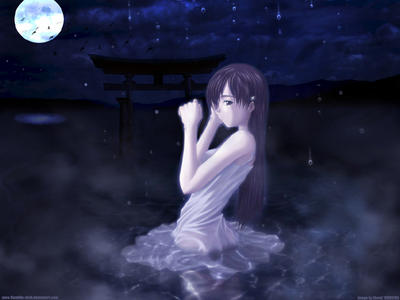
The alchemical unio mentalis is the interpenetration of thought and image, of perceived world and imaginal world, a state of mind no longer concerned with distinctions between things and thought, appearance and reality, or between the spirit that develops the theory and the soul that builds fantasy.
We have colored this unio mentalis "blue," because the blue we have been encountering transfigures appearances into imaginal realities and imagines thought itself in a new way. Blue is preparatory to and incorporated in the white, indicating that the white becomes earth, that is, fixed and real, when the eye becomes blue, that is, able to see through thoughts as imaginative forms and images as the ground of reality.
-- James Hillman, "Blue"
BLUE HENGE
2005
Time and again I keep returning
to pass through you, my Cape,
each voyage a harrow of blue
awfulness, each mash of wind and
wave a saracen raised and set
like the plinth-works of Stonehenge,
your pass a dread cathedral in which
a wilder song is found or sounded
in a deeper throat. I do not know
why I cut these daily stones
from basalt old as God; nor can
I surmise what all these paper
plinths of blue together in their
circle choir or augur or harpuscape
from star or baleen spoor. Are
nipples drawn to lips or do they
ache my dream? Does your brute
socket fit my eye as the sea
it baleful moon, our tides a
mutual haul of lucent noons?
Perhaps. Surely I’m only next
to lose one face as he passed through,
that visage of all I know lost down
in a post-hole or shaft or well
that rings your dread zero,
the heart of all I’ll never know
and dread yet psalm and love.
In this I am son of a thousand
falling ships yet to sire their silt
harbors, my mouth all foam
in gale, each word a berg of sudden
ice I’ve yet to see which sink
me yet again not far from heaven’s
plash a half-mile further on.
For a season I’ve battened hatches
here -- a swooning fragrant month
inside the next summer’s womb,
where sweet and dire nereids
swim the amniotic brine inside
a sheelanagig I cannot see nor
truly brutally enough name. Her keep
this hour, Your Cape our Theme
in all its blue malt heave: Each
wave I hurl a wall, a plinth,
encircling an altar throne which
will not raise until I’ve faced
each pillar of salt with my old
and older names -- Chartres,
Stonehenge, Cape of cyclonic blue,
womb and round and center me
in that interred child’s skull
found split by some ghost axe.
My dragon thirst needs this cup
and I will pour the dregs of you
back down that viral throat.

It is the blue which deepens the idea of reflection beyond the single notion of mirroring, to the further notions of pondering, considering, meditating.
The colors which herald white are spoke of as Isis and the rainbow, as many flowers, and mainly as the brilliance of the peacock’s tail with its multiple eyes. According to Paracelsus, the colors result from dryness acting on moisture. Believe it or not, there is more color in the alchemical desert than in the flood, in less emotion than in more. Drying releases the soul from personal subjectivism, and as the moisture recedes that vivacity once possessed by feeling can now pass over into imagination. Blue is singularly important here because it is the color of the imagination tout court. I base this apodicticus not only on all we have been exploring: the blue mood which sponsors reverie, the blue sky which calls the mythic imagination to its farthest reaches, the blue of Mary who is the Western epitome of anima and her instigation of imaging making, the blue rose of romance, a pothos which pines for the impossible contra naturum (and pothos, the flower, was a blue larkspur or delphinium placed on graves) ...
-- James Hillman, “Blue”
BLUE LANTERN
2005
... all that you need to find poetry
is to look for it with a lantern.
-- Charles Wright, “The Secret of Poetry”
Here in the dead of night
I’m writing maps and copying
psalters, looking for old leys in
dark folds by which to
lamp my pen as I wind
my way into the heart of
that stillness. I’m like a
child playing hopscotch,
nine steps in nine steps out,
quarrying (here) the darkest
minerals I found down and in
the resounding cavern with
its canopy of cold, timeless drips.
It makes for long sentences,
sea-crossings and love-bowers,
each line pushing some limit
like stones falling all the way down
into the exclamation of silt
to disturb everything lost or
tossed there, a skull or
Prospero’s little black book
or an ancient sword my
Lady of Meres haunts
like a sheath. Even down
(here) the world above
has a say; some cankerous low in
Georgia or the Carolinas
keeps sucking huge draughts
of the Gulf of Mexico,
dropping hasty thick washes
of rain in its wake -- the
fifth day now of this crap .
Such storms make the
garden outside at this
black hour loll and snore
like a lover in those first months
of abandon when the sex drowns
everything else, shower upon
shower and the sun ever more pent
and stout and gilded from those
glidings, a brilliant horse galloping
in a sighing singing dark. Quench
me O Lord but never let the thirst
be expired -- that’s the sound of
first lovers, of the garden in June,
of this rapacious pen rising and
falling down the page when all
else drifts in a dark swoon.
Blue lantern, moon of my harrows,
shine just enough for me to see
when I’ve come to the last step
of the song (here) furthest
and down. Grant me blue lysis.
I pause for a moment (here)
to soak the full nougat
of the prima materia, this
blackest of hours; and then
turn back and round, jumping
from stone to stone
toward the last singing line,
door back to day paling far
under the east, this next poem
in hand still dripping with
the lucence of that now fading land.
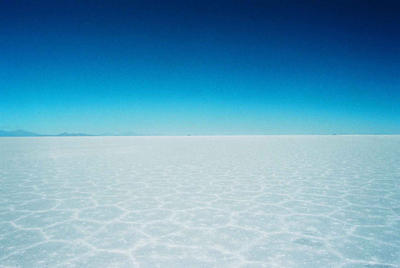

<< Home